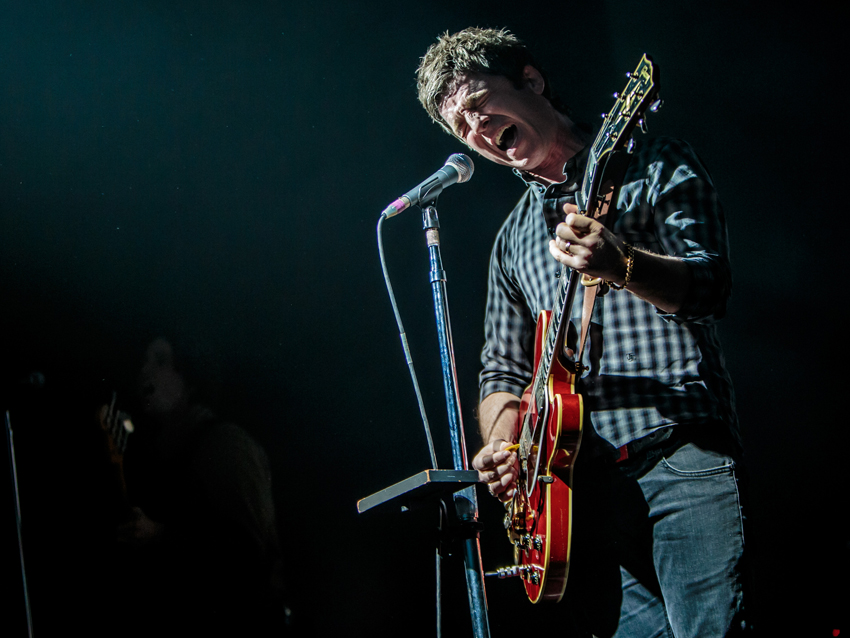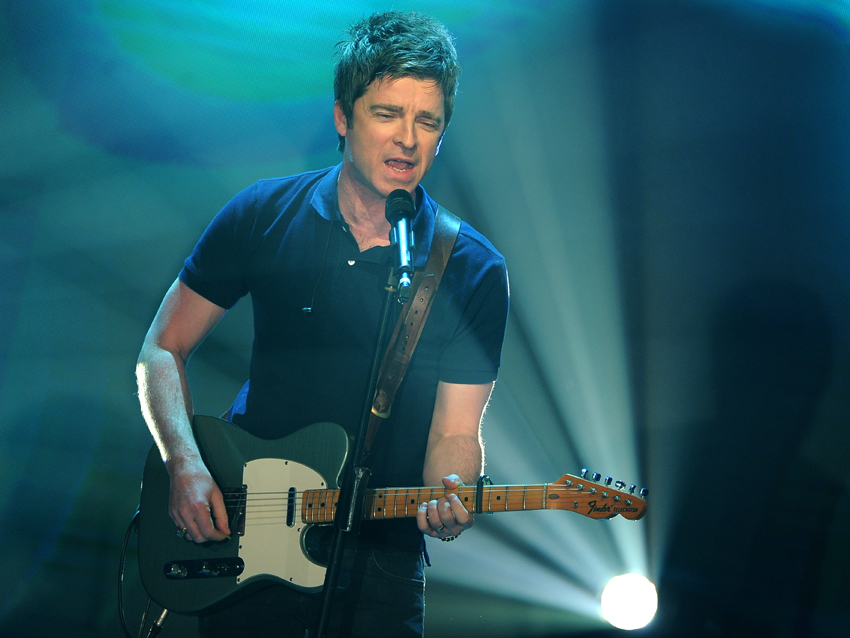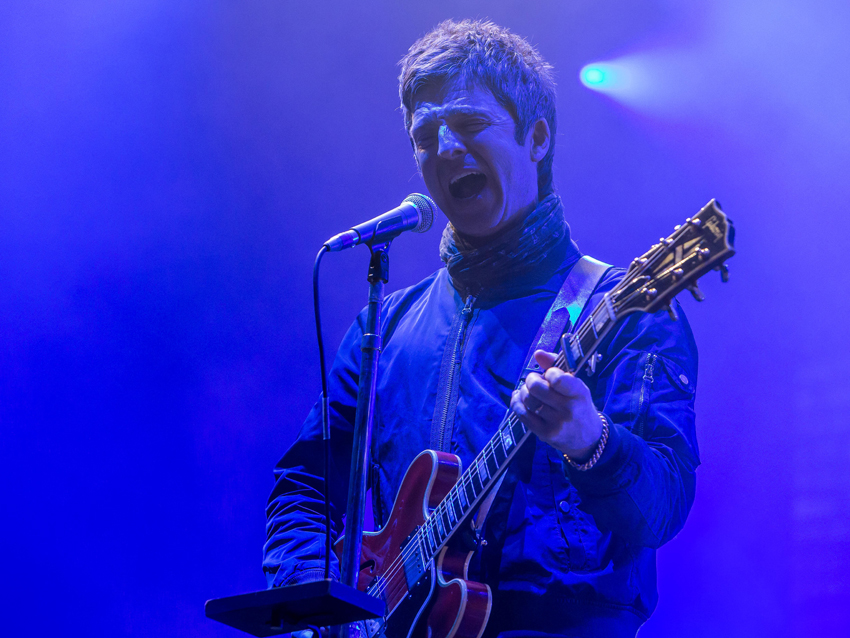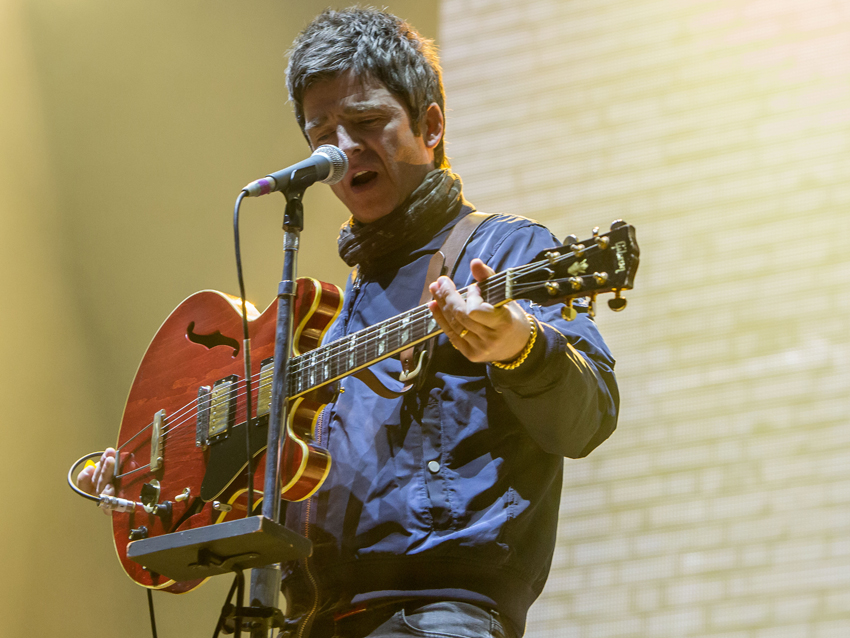
Noel Gallagher talks guitars, production, songwriting and Chasing Yesterday
An interviewer's dream, Noel Gallagher is never at a loss for words – or opinions on just about anything. Asked to assess how he acquitted himself as both musician and producer on Chasing Yesterday, the just-released second album by Noel Gallagher's High Flying Birds, he gets right to it:
"Noel Gallagher the producer thinks Noel Gallagher the musician is a lazy bastard," he says. "He must try harder. He must fucking try harder. He must dig deep and go to the well. Noel Gallagher the musician thinks Noel Gallagher the producer is a genius. And he tries his best, but some things are beyond him, so he has to ask his friends to help him out. They come to an agreement somewhere in the middle that it’s all right, as long as they make a great record.”
Chasing Yesterday builds on HFB's 2011 myriad strengths – it's packed with widescreen hooks, deft arrangements and robust instrumentation – as Gallagher continues his maturation as the preeminent purveyor of smart, dark-hued, majestic rock and effervescent pop. There are a few surprising new wrinkles, such as the honest-to-God sax solo that graces the album opener Riverman (one of Gallagher's best), as well as a trio of female guests vocalists that culminates in a near duet (courtesy of Joy Rose) on the intoxicating The Right Stuff.
During a tour stop in Denmark, Gallagher sat down with MusicRadar to talk about the new album, working with his good friend Johnny Marr, his guitars and gear, and what he thinks of the Blurred Lines verdict.
You're sole producer of Chasing Yesterday, but I have a feeling that you've probably produced a lot of your recordings in the past, despite what the credits might say.
“Yeah. Yeah, that’s true. My role on this album wasn’t too dissimilar to my role on every other fucking Oasis record, apart for the fact that someone else took all the credit for it.”
The sax solo on Riverman threw me at first, but it does work beautifully. What would the Noel from 20 years ago have had to say about a sax break?
“That’s an interesting one. See, this is the great thing about how music evolves. I mean, Riverman and The Right Stuff are about as far and away as you’re gonna get from Supersonic, especially if you’re listening to them one after the other. But if you’re listening to them on the journey, it’s the next logical step, I think. If someone had played me Riverman 20 years ago during the Definitely Maybe sessions, I would’ve thought it was fucking great. No, I probably would’ve thought it was beyond me. It would’ve been at that point.”
Sax solos aside, what can you safely say we’ll never hear on one of your records? You rapping?
“That’s a good one. I might have to do some rapping to get some chart success. So I’m not going to rule out rapping. What I will rule out is toasting – you know, that Jamaican rapping? I won’t do it. And you’re not going to hear any heavy metal. No shredding. No, no, no, there won’t be any shredding on the gee-tar. Not on one of my records.”
You’re touring with a brass section and a full choir. If you keep that up, you’re going to be like the Rolling Stones of the ‘70s.
“That’s right. And I’ll be as broke as them.” [Laughs]

Going with his gut
You feature female vocalists on some tracks – there’s almost a Sergio Mendes vibe on The Right Stuff.
“Oh, wow, thank you. I take that as a compliment.”
When did it enter your mind to include these other voices?
“Here’s what happens: Every song that I write and record always starts off with me playing the acoustic guitar. Once I’ve got that down, I’ll do an acoustic demo to a click track to get the pace of it right. Then I’ll just listen to it and listen to it. I listen to it while I’m in the shower, I’ll listen to it when fucking about at home – whatever. And then when I get into the studio, I just try to follow my instincts.
“That’s how it goes, and nothing is ever off the table. In the case of The Right Stuff, the high bit was too high, the low bit was too low, so I thought, ‘Hey, what about a girl…?’ Once you add that voice on, it becomes more exotic. And then you think, ‘What about a bass clarinet?’ It just evolves over the two or three days you work on it.
“Sometimes you inch forward hour by hour, but there are other songs that you get done in these huge leaps. As long as you get there in the end, that’s all that matters. The big thing is, I know when a song is finished. I know when something is right. I’ve got a sixth sense about it. That’s just with my stuff – I’ve been in the studio working on other people’s songs, and I refuse to get involved with whether something’s finished or not. But when it comes to my own music, I know it when I hear it.”
I see you’re credited as playing electric washboard. I was listening and trying to pick out an electric washboard, but I couldn’t find such a thing. Help me out here.
[Laughs] “Well, you can stop trying to find it. That was a joke.”
Oh, really?
“Yeah, I put that on for the British press because they’re fucking assholes. They want know what shoes you wear when you go to the studio and who you’re hanging out with; what you had for breakfast, what fuckin’ bar you go to and all the stuff. It’s ridiculous! So you have them saying, ‘I hear you play the electric washboard,’ and it’s like, ‘Really? The electric washbord? You fucking moron!’”

Working with Johnny Marr
Well, you got me, ‘cause I was trying to pick it out, and I couldn’t. I even Googled “electric washboards,” and check it out – they do exist.
“They do, indeed. [Laughs] Well, I’ll tell you the truth because I like you. If you were a British journalist, I would’ve kept it going and said whatever. But you’re OK, so I won’t let you make a fool of yourself.”
Bless you, Noel. So the great Johnny Marr plays on Ballad Of The Mighty I. When he comes into the studio, do you tell him what you’re looking for, or do you just see what he’s got?
“It’s the strangest thing. He wouldn’t listen to the backing track before he arrived at the studio, so he no fucking idea what the song was about. He wouldn’t even let me tell him what key it was in or what genre it was. He didn’t want to know anything; he wouldn’t let me say a single word. But I was like, ‘Oh, fuck it. OK.’
“So there were specific gaps in the record that were left for some real guitar work with real character, stuff I couldn’t pull off myself. I didn’t tell Johnny what to do at all, and I swear to God, the first thing he played is what you hear on the record. Not the first take, but the part, the idea – and it was exactly what I heard in my head when I thought about what he might play. It was so beautiful. The man’s a fucking wizard. He’s a genius.”
Johnny’s given you two guitars over the years – the first one you broke on tour.
“Yes. He gave me a guitar, and there was a fight on the stage with some members of the audience – fuckin’ assholes. The guitar got damaged, but he gave me another one to replace it. I’ve still got that one and I still play it from time to time. It’s a bit heavy for me, but it’s a beautiful Les Paul.”
I spoke to Johnny about that. He chalked up giving you the guitars from the drinking he used to do.
“Hmm… Well, the reasons why he gave them to me are irrelevant, because I’ll tell you what’s gonna happen now. He’s not fucking getting them back – that’s for sure. I bought a Fender Stratocaster from him, and I used that to write and record Don’t Look Back In Anger. There might be another one around somewhere that I borrowed from him. Whatever it is, he’s not getting it back.” [Laughs]
Now, if somebody broke a guitar you had given him, would you give him another one?
“Yes. If this fictitious person was as much a fucking gentleman and a good guy as I am, then I would.”

Pedal power
Chasing Yesterday has 10 songs on it. How many were written that didn’t make it on?
“I never go into the studio without 25 or 30 songs completed. Out of those songs, I usually have a core of about five that are definitely going to make up the album, so then you’re just hanging shit around them, trying to get the flow and the pace right. I’ve gotta say, of the five I had going in, only three made it, so the rest were things that I didn’t thing were going to make it.
“As the record took on a more relaxed, eclectic feel, it became like, ‘Fuck, let’s use The Right Stuff here and Ballad Of The Mighty I there… ‘ I guess when you produce yourself you just wind up pleasing yourself. I might well have been talked out of The Right Stuff by Dave Sardy, for instance, and something else might have wound up in its place. I just go with my gut all the time. All the time.”
What kinds of things does Paul Stacey play on the record? It’s hard to tell his guitar sound from yours sometimes.
“I’ll tell you what he’s playing. He does the solo on Riverman, the Santana-esque one – it’s like Santana crossed with Peter Green. He plays the solo on The Girl With X-Ray Eyes, the David Bowie-sounding one. And he plays the solo on The Right Stuff. The rest is all me.
“Paul is amazing. Amazing. We sit and write ‘em together. I’ll play a bunch of solos, and I’ll get bored and say, ‘I don’t like it. It’s not good enough.’ Then I’ll give it to him with the same sound, and I’ll start the track and go, ‘That bit.’ We’ll stop the tape and get the bit, like, ‘That should be the opening bar,’ and we’ll just take it from there. Once we sort of get all the bits, we’ll record the whole thing in one live take.”
You’ve relied on a group of guitars over the years – anything new on this record?
“On this record, all over it, is a Nash ’63 Stratocaster, which is fucking outrageous, and I have a brown Nash Tele Deluxe, a ’72, which is also great. I used my Gibson 355, obviously, and my brand-new Martin D-28, which sounds like it was fuckin’ bought in the ‘50s.
“What else? Custom Hiwatt 50 heads through brand-new Hiwatt heads, and a really fucking great Fender Blackface Deluxe. Lots of Strymon effects pedals – lots of that shit. There’s this clean boost pedal I use called Big Trees; it's like a signal enhancer or something, and it's fucking great. It's on every single take of guitar. Thing looks great as well.”

Song sound-alikes
Do you record to tape?
“Good God, no. No, no, no. All over the studio, every piece of gear is vintage, but with tape machines, it’s just not practical.”
What are your thoughts on the Blurred Lines ruling? I’m especially curious because, back in the ‘90s, you did include Stevie Wonder on the songwriting credits on the song Step Out.
“In the case of Step Out, what happened was, it’s pretty obvious that the chorus is similar to [Stevie Wonder’s Uptight]. I went to the people and said, ‘Look, I’ve written this song and I’d like to use it. Clearly it’s gonna cause problems – what are we gonna do? And they said, ‘You have to do this,’ and that’s what we did.
“For my part, I wasn’t aware of the Marvin Gaye track they were on about in respect to Blurred Lines. When I heard it the other day, I thought it sounded fuck-all like Blurred Lines. Are we talking about a cowbell here?”
The musical bed of the song, not necessarily the melody.
“Can you copyright a rhythm? If so, then surely to God every reggae artist in the world is fucked. I don’t know the ins and outs of this case. As for myself, I’ve had to give up royalties twice – one was for lyrics and one was for music. Each time it was like, ‘Whatever.’ But it’s part of the game.
“Popular music has been going since the ‘50s. I mean, there’s only 36 chords or however many there are. You’re gonna be standing on somebody’s toes at some point. You can’t argue with a judge, I guess. But I listened to Blurred Lines and I listened to the other thing, and I don’t know what they’re going on about.”
Does songwriting come as easily as it used to? When you’re young, you’re experiencing an explosion of feelings, but as you get older, and you have more responsibilities, I imagine the process can get harder.
“There’s a great book called Isle Of Noises, and it’s interviews with 30 of the great British songwriters: Jimmy Page, Paul Weller, Paul McCartney – I include myself because I’m in it – Ray Davies, blah blah blah. Everybody has a different take on songwriting. There are no rules; nothing is set in stone.
“I don’t write any more or less than I used to. I might come up with 15 great ideas in four weeks, and then not come up with anything else for six months. But I don’t worry about it, because out of those 15 great ideas, only two of them might take it onto a record. It’s quality, not quantity, and I don’t really care.
“If someone were to come into a room and say, ‘Well, that’s it. You’ll never write another song,’ I could look at what I’ve done and go, ‘Fuckin’ hell, I wrote Live Forever. And I wrote Rock ‘n’ Roll Star and Champagne Supernova and Don’t Look Back In Anger and Riverman and Everybody’s On The Run, blah blah blah.’ I’d be pretty happy with that. I carry on, not for fear of not writing, but because I fucking love it. I love writing songs.”
Joe is a freelance journalist who has, over the past few decades, interviewed hundreds of guitarists for Guitar World, Guitar Player, MusicRadar and Classic Rock. He is also a former editor of Guitar World, contributing writer for Guitar Aficionado and VP of A&R for Island Records. He’s an enthusiastic guitarist, but he’s nowhere near the likes of the people he interviews. Surprisingly, his skills are more suited to the drums. If you need a drummer for your Beatles tribute band, look him up.
